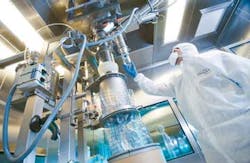German chemical and pharmaceutical giant Bayer has developed an ambitious program that aims to cement the company's position among the leading names in the global pharmaceutical industry. According to its plan, Bayer estimates that five of its new medicines will see combined sales worth EUR5.5 billion ($7.2 billion) by 2015.
The German pharmaceutical company has set its bar high, despite the fact that riociguat and alpharadin (radium-223 chloride) have still not received formal approval. However, its expectations for the next couple of years are positive, mostly based on the recently launched Stivarga, Eylea and Xarelto. Those three, along with alpharadin, which will be used to treat patients in advanced stages of cancer and is predicted to be on sale by the end of this year, are already identified as potential blockbusters.
Bayer recently added riociguat to the group of key developments for its business. The medicine is used to treat chronic thromboembolic pulmonary hypertension (CTEPH) and pulmonary arterial hypertension (PAH). In February, the drug was submitted for approval by regulators in the United States and Europe.
RELATED: Pharm industry sales to top $1.2 trillion by 2016
The remaining three drugs included in the portfolio have already been launched. Stivarga (regorafenib) received approval last year in the United States and is used in the treatment of metastatic colorectal cancer and advanced gastrointestinal stromal tumours (GIST), while Eylea (aflibercept), which was developed in partnership with Regeneron, is available on both sides of the Atlantic to be used in treating eye disorder wet age-related macular degeneration (AMD).
The last drug, the anticoagulant Xarelto (rivaroxaban), appears to be the company's heavy artillery. It has been granted numerous approvals worldwide, including indications in deep vein thrombosis (DVT), pulmonary embolism (PE) and the prevention of stroke in people with atrial fibrillation. It is predicted that Xarelto alone could generate sales of more than EUR2 billion ($2.6 billion) by 2015, according to Bayer.
Strong sales of these five drugs are predicted to boost revenues for Bayer. For 2012, the company expects to see an increase in total group sales of about 8.8 percent to EUR39.8 billion ($51.8 billion). Meanwhile, sales for the company's pharmaceutical and consumer health division, Bayer Healthcare, are expected to increase at a similar rate of 8.4 percent to EUR18.6 billion ($24.2 billion). Pharmaceutical products were up 4.2 percent to EUR10.8 billion ($14 billion), with best-selling products including multiple sclerosis drug Betaferon/Betaseron (beta interferon 1b), which saw sales climb 4.2 percent, while sales of the blood-clotting product Kogenate (antihaemophilic factor) were up by 5.2 percent.
These strong performers helped balance a decline in revenues generated by the Yaz contraceptive franchise, which lost patent exclusivity in 2012. At the company's annual press conference in Leverkusen last week, Bayer's chief executive Marijn Dekkers said that 2012 revenues will be hit by EUR1.2 billion ($1.6 billion) in charges related to settling lawsuits concerning Yaz. The company has settled about 4,800 claims in the United States but there are 13,600 lawsuits pending, he stated.
